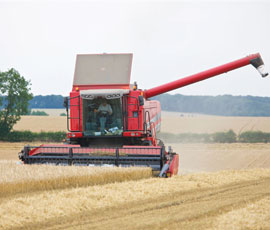Harvest roundup: Stepping up a gear

A dry weekend for many has enabled harvest to step up a gear, with yields proving extremely variable across the country.
In Suffolk, Andrew Maddever had cut about 300ha of winter wheat at Hall Farm, Whetstead, with very mixed results.
“We’ve cut about 50ha of Oakley today (13 August) and it’s yielding between 8.75t/ha and 9.25t/ha,” he said.
“I’m not desperately disappointed with that, except that it looked like a 12t crop all year.”
Further west, Roger Brian had just started combining winter wheat at Park Farm, Hanbury, Worcestershire.
“I don’t think it will be as good as last year – it’s quite shrivelled up,” he said.
However, having made a start, he had now stopped again, with the moisture up at 19%. “We just need some sun.”
The lack of sun seemed to have almost universally resulted in poor grain fill, whether in wheat, barley or oilseed rape.
In Berkshire, Richard Brown was disappointed with rapeseed yields at Priors Farm, Peasemore, and said his wheat crops looked similarly poor.
“We cut all our oilseed rape on Thursday and Friday, and it’s probably only averaged 2.5t/ha,” he said.
“Everyone around here has found the same. They have got very small grains and poorly filled pods – I should think the thousand grain weight will be pretty low.”
However, it was a different story in Northumberland, where Carl Tuer started combining oilseed rape at Rock Farms, Alnwick, today, having just finished his winter barley.
“The rapeseed seems very good – if it’s not doing 5t/ha it’s not far off,” he said.
However, Cassata winter barley had been very variable, averaging 6.9t/ha on one farm and over 7.4t/ha at another.
“Climatically, the variation within just 10 miles has been unbelievable – one farm got the rain while the other didn’t.”
In Nothern Ireland, harvest had barely started, but yields were unlikely to match last year’s levels, according to Charles Davidson at North Down Grain.
“We don’t have an awful lot of winter barley or oilseed rape in this part of the world, but what barley has been coming in is 2.5t/ha down on last year,” he said.
“Wheat is still at least two weeks away, and spring barley three weeks – it’s very, very late.”

